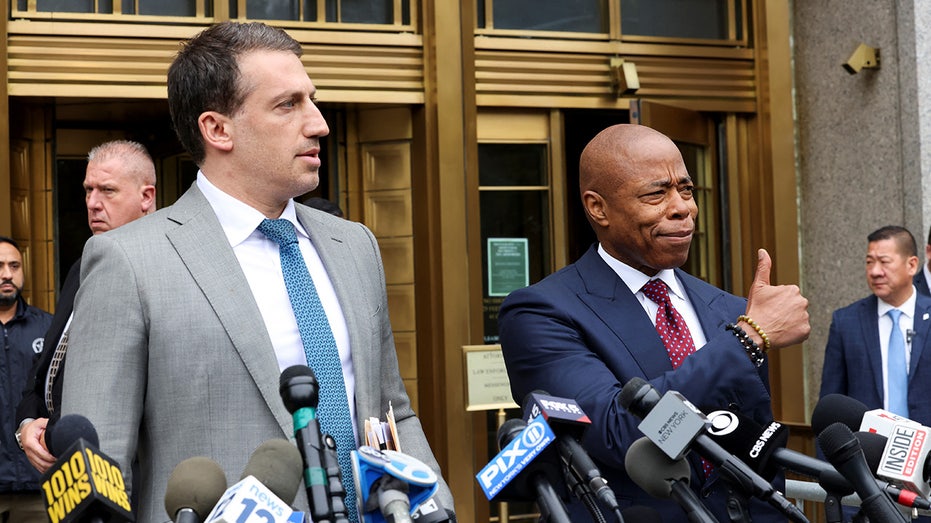
Months after the Supreme Court sided with an Indiana mayor who took payment from a Peterbilt dealer in a small-town bribery case, New York City Mayor Eric Adams is relying on the precedent as he revs up the fight against his own federal corruption charges.But some experts say the effort may run out of gas before it picks up speed.Federal prosecutors rely on a law known as Section 666 to take down corrupt officials who accept bribes, but they have also been accused of trying to blur the definition of a bribe. They also have to prove an « official act » took place in exchange for whatever the allegedly corrupt politician was raking in.NYC MAYOR ERIC ADAMS PLEDGES TO ‘REIGN’ NOT RESIGNIn 2016, the Justice Department filed corruption charges against James Snyder, former Republican mayor of Portage, Indiana, under the Section 666 rule.He oversaw a $1.1 million deal to buy garbage trucks for the city from Great Lakes Peterbilt in 2013, according to court filings. In 2014, he received a $13,000 check from the dealership.The FBI and federal prosecutors accused him of taking the money as a kickback for the truck sales. Snyder said it was payment for consulting services in a state where public officials are allowed to have outside employment. He was convicted at trial, but his legal saga continued for years. After successfully seeking a retrial, he wound up convicted again and then lost his first appeal.But in a 6-3 opinion written by Justice Brett Kavanaugh, the Supreme Court ruled in his favor, explaining that anti-bribery laws don’t make all payments illegal, especially if they come after the fact without any evidence of a corrupt agreement. Read Eric Adams’ latest court filing:FEDS SEIZE ERIC ADAMS’ PHONE AFTER NYC MAYOR’S INDICTMENTSnyder accepted a « gratuity, » not a bribe, the court found.The court described gratuities as two forms of payment, neither of which met the definition of a bribe. The first is something given as a « thanks, » anything from a fancy lunch to a framed photograph. The second are gifts designed to « curry favor » but not in exchange for anything specific.In a dissent by Justice Ketanji Brown Jackson, the court’s liberal wing countered that there was still evidence of corruption that would have made Snyder’s payment unlawful. Kavanaugh wrote that the gratuities were not a federal crime but could still violate state and local ethics rules. Snyder was not accused of any crimes at the state level.ADAMS’ OFFICE LASHES OUT AT FBI EMPLOYEE WHO MIGHT HAVE ‘IMPROPERLY LEAKED DETAILS’ OF CORRUPTION PROBEKavanaugh also warned that if a federal law did crack down on gratuities, it could unlawfully infringe on states’ right to regulate interactions between their own officials and constituents.Adams’ lawyers are arguing that the mayor never accepted any bribes and never took any actions in his official capacity to make good on a quid quo pro.Anthony Capozzolo, a former federal prosecutor who handled public corruption cases in a neighboring district, said prosecutors clearly spelled out the alleged quid quo pro in Adams’ indictment but that the mayor could have a better chance proving he made no « official act. » »This issue about him not being the mayor at the time, and what is the official act? That may get more scrutiny from the court, » Capozzolo told Fox News Digital.Adams’ lawyer, Alex Spiro, wrote in the motion Monday that prosecutors failed to lay out an actual bribery case. »The indictment in this case alleges a ‘bribery’ scheme that does not meet the definition of bribery and indeed does not amount to a federal crime at all, » Spiro wrote in a court filing revealed Monday. « It appears that after years of casting about for something, anything, to support a federal charge against New York City Mayor Eric Adams, prosecutors had settled on a theory that depended on the Department’s longstanding view that Section 666 criminalizes gratuities, including gifts meant to curry favor with governmental officials but not linked to any specific question or matter, » Spiro wrote. « When the Supreme Court rejected that interpretation in June, prosecutors simply added a few vague allegations and called their theory bribery — ‘a far more serious offense than gratuities.’ »Adams’ defense argued that the Justice Department’s case « doesn’t work. » »The indictment does not allege that Mayor Adams agreed to perform any official act at the time that he received a benefit. Rather, it alleges only that while serving as Brooklyn Borough President—not Mayor, or even Mayor-elect—he agreed generally to assist with the ‘operation’ or ‘regulation’ of a Turkish Consulate building in Manhattan, where he had no authority whatsoever, in exchange for travel benefits, » Spiro wrote.At issue are three text messages that prosecutors say Adams, during a past term as Brooklyn’s borough president, sent to the former FDNY commissioner, Daniel Nigro. But there is additional context and conversations surrounding the texts that may convince the court they are less innocent than they sound when read alone, Capozzolo said.Eric Adams texts to FDNY commissioner: Spiro asked the court to dismiss the bribery charge due to the Snyder precedent and argued that the rest of the charges should get tossed because they were allegedly based on « a host of false claims evidently attributable to a self-interested staffer with an axe to grind. »NYC MAYOR ERIC ADAMS’ ELECTRONIC DEVICES SEIZED BY FBI AMID CAMPAIGN INVESTIGATIONBut Capozzolo pointed to page 33 of the indictment, where prosecutors spelled out an alleged series of phone calls between Adams, a staffer and a Turkish official, in which the official told Adams it was « his turn » to repay a favor and the mayor allegedly replied, « I know. » »That’s about as quid pro quo as you’re going to get, » Capozzolo said.Read the Eric Adams indictment:On the other hand, the government may have an uphill battle proving Adams actually returned the Turks a favor with an official act. »Adams may have a chance of getting the charge dismissed as a result, » Neama Rahmani, another former federal prosecutor, told Fox News Digital.He said the Snyder decision « significantly » weakened the federal bribery law and noted that it’s not uncommon to see convictions under the statute get overturned on appeal. »The Supreme Court has also required an official act for a bribery conviction, » he said. « Adams was a candidate for mayor, but he was the Brooklyn borough president at the time, which means he didn’t have official authority over a building in Manhattan. The defense is using that important fact to argue that there could be no official act for the purpose of the bribery statute. »CLICK HERE TO GET THE FOX NEWS APPBefore the Justice Department announced Adams’ indictment last week, the mayor accused federal investigators of retaliation over his criticism of President Biden and Vice President Harris for their handling of the southern border, which he said led to a migrant crisis in New York City that overloaded its shelter system. The influx of illegal immigrants coincided with a spike in robberies in the Big Apple, city police said earlier this year.Still, the federal investigation has ensnared numerous people in the mayor’s orbit, including campaign staffers, city officials and even his former police commissioner, in an alleged corruption ring of such a scale that Capozzolo said it’s a throwback to the 1800s-era Tammany Hall and Boss Tweed. Adams could face up to 45 years in prison if convicted of all charges, which include one count of conspiracy to receive campaign contributions from foreign nationals and commit wire fraud and bribery, one count of wire fraud, two counts of soliciting campaign contributions from foreign nationals, and one count of soliciting and accepting a bribe.
Source link : https://www.foxnews.com/us/eric-adams-defense-hinges-supreme-court-ruling-heartland-trucking-case
Author :
Publish date : 2024-10-01 10:00:42
Copyright for syndicated content belongs to the linked Source.


